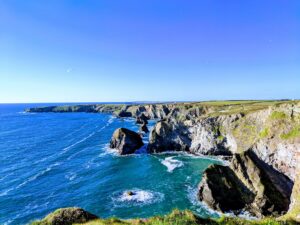Recreational activities are threatening UK marine life, according to a new report
Conservation work is being undermined by increased disruption to UK seas, according to a new report published by the Wildlife Trust.
Overall, the report highlights that there have been many conversation successes over the last 12 months.
For example, strong numbers of humpback whales were spotted around the UK, with more than 75 sightings recorded since 2019 by Cornwall Wildlife Trust alone.
However, according to the authors, climate change has led to marine creatures making unusual appearances. From the arctic walrus nicknamed wally to a reported sighting of a pufferfish.

Extreme weather has also led to hundreds of starfish, seal pups being washed up dead. In Cornwall alone, over 170 cetaceans (whales, dolphins, and porpoises) and 247 seals were stranded this year.
Recreational activities are also making it harder for marine life to cope. Cornwall Wildlife Trust reported that disturbances in marine wildlife have tripled since 2014, with an increase in jet skis and motorboats a major cause for concern.
Dorset Wildlife Trust also recorded damage caused by large cruise ships that were moored off the coast due to the pandemic. Surveys found that the ship’s anchors created deep scars in the seabed, affecting wildlife habitats and the seabed’s ability to store carbon.
The Wildlife Trusts are working to restore the UK’s marine habitats and are calling for at least 30% of our seas to be protected by 2030.
This includes creating Highly Protected Marine Areas, better planning for development at sea, and an increase in monitoring marine life.
Lissa Batey, head of marine conservation for The Wildlife Trusts, said: ‘It’s been a fantastic year for marine megafauna sightings, particularly in the southwest, but it’s clear that our oceans are under immense pressure from fishing, development, pollution, climate change and recreation. All these issues are having a huge impact on life at sea.
‘COP26 really brought home the need to limit global temperature rises to a maximum of 1.5°. Protecting our marine environment is a critical part of achieving that goal because healthy seabed habitats store carbon. We need policies that stop unsustainable fishing practices and prevent unrestricted development at sea – and we must protect at least 30% of our oceans by 2030. Future generations are counting on it.’















